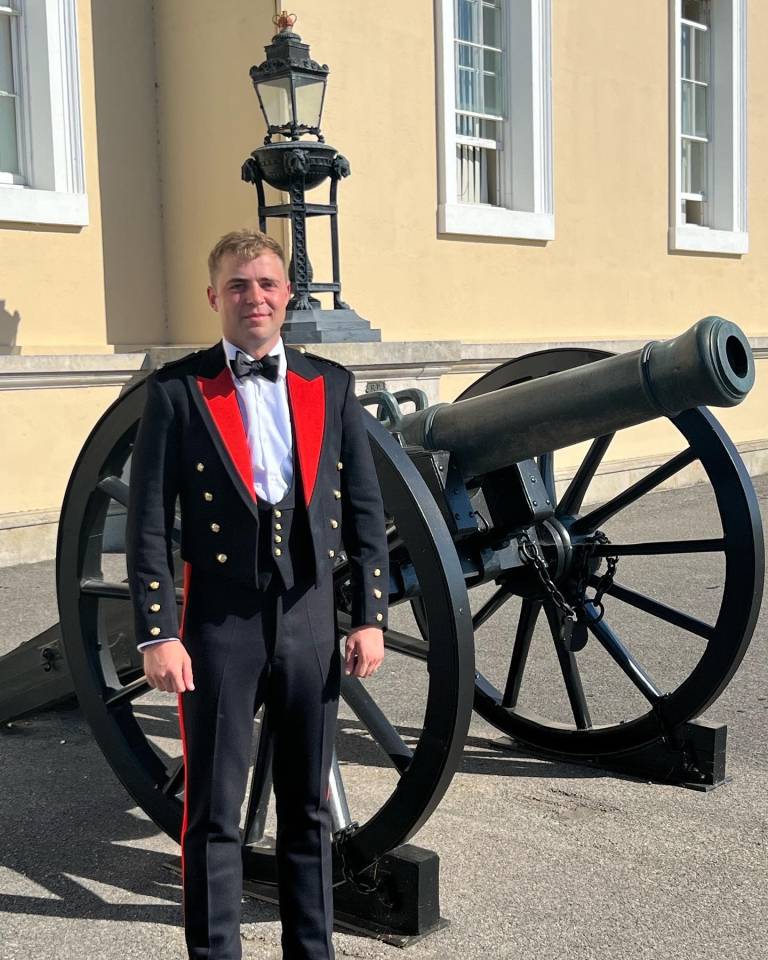Cameron Fairrie
Cameron graduated from BA History in 2019 and is now a Lieutenant in The Royal Regiment of Artillery, British Army.

17 January 2024
Tell us about your career path, from graduation to where you are now
After I graduated I started applying for jobs in London and was hired by the first one I interviewed for, which was a sales role at a marketing company called MVF Global. After working there for 18 months I decided to leave and join the Army, which involved a lengthy application process; all of the information about it can be found on their website. I then had to complete 48 weeks of training at The Royal Military Academy Sandhurst before I commissioned as an Officer. The experience I gained at MVF certainly helped me land my job in the Army, as it gave me the confidence to engage with people and the mental resilience to keep going when things got tough.
What are your core duties and what skills are important to your role?
The role of a junior officer in the British Army can vary widely depending on which regiment you wind up in and what tactical function they serve. In my current role as an Air Defence Troop Commander, my tactical role involves liaising with senior commanders to brief them on what capability our air defence assets can provide them on the ground. It can also require me to conduct reconnaissance on the ground to determine where I want to deploy my assets, based on the mission I have been given.
Equally, all Army Officers are first and foremost managers of people, and much of the work we do day to day is the same, regardless of our battlefield role. We manage our soldiers' careers, plan and deliver their training, look after their welfare and help to develop them as people. It is a job that requires a great deal of soft skills as well as the ability to endure difficult situations. Not only do you need to be physically and mentally resilient, but emotionally intelligent and empathetic as well.
How did your time at UCL prepare you for the workplace?
UCL is a good place to develop a sense of independence and self-motivation. London is a fast paced city that doesn't bend for anyone; you have to make it work for you and it can be tough at times. It's really rewarding when you manage it though and will give you the confidence to live anywhere. I was very self-motivated and independant when it can to my job searching, something which is useful in any career path in life.
Were there any challenges in your job hunt? How did you overcome these?
I initially applied to go to Sandhurst in my final year, but was rejected on medical grounds. Luckily I was able to appeal the decision but it took years due to Covid disrupting the whole process. Once I had graduated, I started applying to jobs straight away. I had no idea what to do because I had always planned on joining the Army, so I spoke to my friends and one of them recommended that I apply to MVF. After I applied they offered me an interview and hired me within a few weeks.
In the end it didn't work out, although I stayed there for 18 months and learned some useful skills along the way. It just wasn't a job I had ever set out to do and I struggled to motivate myself to keep up with its demands. In the end I took a leap of faith and quit the month before my final assessment for the Army. I spent that time focusing all my efforts on passing that assessment and luckily it paid off.
Top tips for current students:
1. Don't go for the low hanging fruit. You don't have to take the first job you're offered and you are better off waiting to find the job that is right for you.
2. Think carefully about what motivates you. Once you go into the world of work, that work will become a large portion of your life. If you don't enjoy what you do on a daily basis, life can really suck.
3. Don't be afraid to take risks to get where you want to be in life. As long as that risk is calculated and not reckless, then it's worth taking.
 Close
Close

